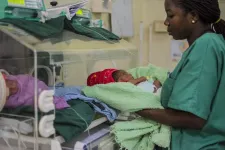(Press-News.org) Without more legally binding and well-planned net-zero policies, the world is highly likely to miss key climate targets.
In the new study, led by Imperial College London and published today in Science, researchers ranked 90% of global net-zero greenhouse gas emissions pledges as providing low confidence in their full implementation.
The researchers recommend nations make their targets legally binding and back them up with long-term plans and short-term implementation policies to increase the likelihood of avoiding the worst impacts of climate change.
Lead researcher Professor Joeri Rogelj, director of research for the Grantham Institute at Imperial, said: "Climate policy is moving from setting ambitious targets to implementing them. However, our analysis shows most countries do not provide high confidence that they will deliver on their commitments. The world is still on a high-risk climate track, and we are far from delivering a safe climate future.”
Assigning confidence
Climate goals set out in the Paris Agreement include keeping temperature rises well below 2°C above the average temperature before the industrial revolution and ideally below 1.5°C. The main way to achieve this is the reach ‘net-zero’ greenhouse gas emissions as soon as possible, where any remaining emissions are effectively offset.
Most countries have set net-zero goals and Nationally Determined Contributions (NDCs) – non-binding national plans proposing climate actions. Taking these plans at face value, and assuming they will all be fully implemented, gives the world a chance of keeping warming to 1.5-2⁰C. But taking current policies only, with no implementation of net-zero pledges, means models predict temperature rises could be as much as 2.5-3⁰C by 2100, with warming still increasing.
To reduce the uncertainty in which of these scenarios is likely to happen, the team, including researchers from the UK, Austria, USA, Netherlands, Germany, and Brazil, assigned a ‘confidence’ to each net-zero policy. They assessed 35 net zero targets, covering every country with more than 0.1% of current global greenhouse gas emissions.
The confidence assessment was based on three policy characteristics: whether the policy was legally binding, whether there was a credible policy plan guiding implementation, and whether short-term plans would already put emissions on a downward path over the next decade.
Based on this, policies were given ‘higher’, ‘lower’ or ‘much lower’ confidence of being fully implemented. Some regions scored highly, including the European Union, the United Kingdom and New Zealand, but around 90% scored ‘lower’ or ‘much lower’ confidence, including China and the US, which together account for more than 35% of current emissions.
Modelling emissions
From this assessment, the team modelled five scenarios of future greenhouse gas emissions and resulting temperatures. These were: considering only current policies (the most conservative scenario); only adding in policies that have a high confidence of being implemented; adding policies with high and low confidence; adding all policies regardless of confidence as if they are implemented; and a scenario where all policies are fully implemented and all NDCs are met (the most forgiving scenario).
The most conservative scenario had the largest uncertainty, with a range of 1.7-3°C and a median estimate of 2.6°C. The most optimistic scenario has a range of 1.6-2.1, with a median estimate of 1.7°C. This might suggest that, if all net-zero policies are fully implemented, the Paris Agreement goals are withing reach. However, with so many policies ranked in the low-confidence end of the scale, this would be wishful thinking in absence of further efforts.
Co-author Taryn Fransen, from the World Resources Institute in Washington DC, and the Energy and Resources Group at the University of California–Berkeley, said: “Climate change targets are by their nature ambitious – there’s no point in setting a target for a foregone conclusion. But implementation must follow.”
Catalysing action
Only twelve out of 35 net zero policies are currently legally binding, and the researchers say increasing this number would help ensure the policies survive long-term and catalyse action. Countries also need clear implementation pathways for different sectors, outlining exactly what changes are needed and where the responsibility lies.
Co-author Dr Robin Lamboll, from the Centre for Environmental Policy at Imperial, said: “Making targets legally binding is crucial to ensure long-term plans are adopted. We need to see concrete legislation in order to trust that action will follow from promises.”
The team included researchers from Imperial College London (UK) the International Institute for Applied Systems Analysis (Austria), the World Resources Institute (US), the University of California–Berkeley (US), the Netherlands Environmental Assessment Agency, the Institute for Environmental Studies (Netherlands), the NewClimate Institute (Germany), the Copernicus Institute of Sustainable Development (Netherlands), and the Universidade Federal do Rio de Janeiro (Brazil).
END
Without fully implementing net-zero pledges, the world will miss climate goals
2023-06-08
ELSE PRESS RELEASES FROM THIS DATE:
Breakthrough: Scientists develop artificial molecules that behave like real ones
2023-06-08
Scientists from the Radboud University have developed synthetic molecules that resemble real organic molecules. A collaboration of researchers, led by Alex Khajetoorians and Daniel Wegner, can now simulate the behaviour of real molecules by using artificial molecules. In this way, they can tweak properties of molecules in ways that are normally difficult or unrealistic, and they can understand much better how molecules change.
Emil Sierda, who was in charge of conducting the experiments at Radboud University: ‘A few years ago we had this crazy idea to build a quantum simulator. We wanted to create artificial ...
Global study highlights deaths from neonatal sepsis and steps to improve treatment
2023-06-08
A global observational study co-led by UCL (University College London), which involved more than 3,200 newborn babies suffering from sepsis in 19 hospitals in 11 countries, has shown that many newborns are dying because the antibiotics used to treat sepsis are losing their effectiveness.
The study, conducted from 2018 to 2020, found there was high mortality among infants with culture-positive sepsis (almost 1 in 5 across the hospital sites), and a significant burden of antibiotic resistance. The study has provided a wealth of high-quality data aimed at improving the treatment of newborn babies with sepsis.
The findings of the observational study ...
Why certain fish are left off the hook
2023-06-08
As warming waters threaten fish populations and disrupt fisheries around the world, it is critical to find ways to sustain fisheries while at the same time allowing those fisheries to remain economically viable to those who depend on them for their livelihoods. In the United States, commercial fishing employs 1.2 million Americans and generates more than $165 billion annually.
The primary way that the United States has protected its fisheries is through the Magnuson-Stevens Act, which was modernized in 1996 to foster the long-term biological and economic sustainability ...
In schools that could benefit most, building relationships is key to increasing capacity for nutrition education programming
2023-06-08
Philadelphia, June 8, 2023 – The US Department of Agriculture Supplemental Nutrition Assistance Program-Education (SNAP-Ed) provides nutrition programming to individuals with low income, including students and their families, through a network of community partners who implement the programs. Findings of a new study in the Journal of Nutrition Education and Behavior, published by Elsevier, suggest SNAP-Ed implementers could develop a school’s readiness for programming by concentrating efforts on cultivating relationships, program-specific capacity, and motivation at schools.
Lead author Erin McCrossan, PhD, Office of ...
Study uncovers how B cells react to skin cancer
2023-06-08
A new study that sheds light on how B cells react to skin cancer cells could pave the way for innovative therapy design.
The study, published today in Nature Communications and led by researchers from King’s College London, reveals that antibody-producing B cells in patients may be defective in responding to the most aggressive skin cancer, melanoma.
Antibodies are produced by B cells, a type of white blood cell, and are made to prevent and help fight infections. However, there is limited understanding about how B cells are prompted to respond to melanoma and why the antibodies they make are not effective.
Researchers ...
Universities in California, Arizona, and Nevada form consortium to address clean water access and sustainability challenges
2023-06-08
A novel collaboration between the University of Southern California (USC), the University of Arizona (UA), and the University of Nevada, Reno (UNR), has resulted in the Water Reuse Consortium. This groundbreaking partnership has been awarded a $12.3 million cooperative agreement for phase one of a three-phase $38 million program with ERDC-CERL to tackle pressing water challenges through innovative research, education, communication, and unprecedented collaborative efforts between government, local communities, industry, and academia.
The Water Reuse Consortium brings together ...
Henry Ford Health researchers launch clinical trial studying therapy aimed at causing brain cancer cells to self-destruct
2023-06-08
DETROIT (June 8, 2023) – Researchers in the Hermelin Brain Tumor Center at Henry Ford Health are leading a Phase I clinical trial studying the maximum tolerated dose of an oncolytic adenovirus, a mutated virus engineered to selectively replicate in and destroy cancer tissue, in combination with fractionated stereotactic radiosurgery among patients who are undergoing resection of a recurrent high-grade astrocytoma brain tumor.
“The participants in this study have progressive high-grade astrocytoma as well as glioblastoma, and are scheduled to undergo repeat surgery,” said Tobias ...
Resuscitation after on-field cardiac arrest should start with teammates
2023-06-08
It is well known that early resuscitation with cardiopulmonary resuscitation (CPR) and an automated external defibrillator (AED) saves lives, and in most sports-related sudden cardiac arrest events, trainers or medical personnel respond and initiate protocols to resuscitate a player while other athletes standby. However, time to treatment is critical, so the ability for a fellow athlete to recognize sports-related sudden cardiac arrest and initiate resuscitation while medical personnel arrive is crucial in a life-threatening event where seconds matter. However, in a new study presented at the American ...
Place of death from cancer in US states with vs without palliative care laws
2023-06-08
About The Study: The results of this study suggest that state palliative care laws are associated with an increase in the likelihood of dying at home or in hospice among decedents from cancer. Passage of state palliative care legislation may be an effective policy intervention to increase the number of seriously ill patients who experience their death in such locations.
Authors: May Hua, M.D, M.S., of the Columbia University College of Physicians and Surgeons in New York, is the corresponding author.
To access the embargoed study: Visit our For ...
Projected health outcomes associated with Supreme Court decisions in 2022 on COVID-19 workplace protections, handgun-carry restrictions, and abortion rights
2023-06-08
About The Study: The findings of this study suggest that outcomes from Supreme Court decisions in 2022 that invalidated COVID-19 workplace protections, voided state laws on handgun-carry restrictions, and revoked the constitutional right to abortion could lead to substantial harms to public health, including nearly 3,000 excess deaths (and possibly many more) over a decade.
Authors: Adam Gaffney, M.D., M.P.H., of Harvard Medical School in Boston, is the corresponding author.
To access the embargoed study: Visit our For The Media website at this ...

